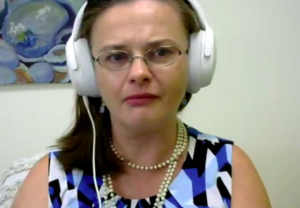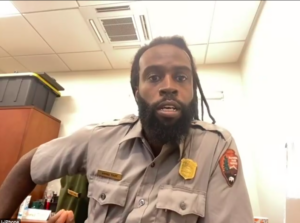A panel of scientists and interested community members joined the Friends of V.I. National Park in a virtual meeting on Monday to talk conservation.
“This panel conversation looks to explore the various lenses each of us bring to the conversation, to highlight the common priorities and values we share, and recognize and discuss differences,” Tonia Lovejoy, executive director of Friends of Virgin Islands National Park, said at the beginning of the meeting.
She told the Source the reason for the meeting is that “conservation is a complicated topic with no short, easy answers.”
For the next hour, the participants of the conservation conversation talked about their work and passion for protecting the land and culture of the Virgin Islands.

Kitty Edwards, Department of Planning and Natural Resources director of the Territorial Park System, pointed out that she feels the term “environmentalist” is not accurate. She shared that as an example, oil workers call themselves “environmentalists” for no other reason than the fact that they work in the environment.
She believes it should be about preserving our natural and cultural resources.”If you think about what you are conserving and what you are protecting, it is…taking something that exists and making sure it doesn’t go away,” Edwards said.
Lawrence Boschulte and his grandparents were all born in the territory. He is a well-known community figure and has served as an advisory board member for the Friends. He said he is trying to have conversations and educate the public about preserving the environment and what will happen if we don’t.
Professor Hadiya Sewer, director of the Virgin Islands Caribbean Culture Centers and president of the St. John Heritage Collective, said she is deeply concerned about the future of human and non-human life in the territory. Her V.I. roots go back to the 1600s.
She spoke about the exclusion of local and ancestral people when studying how to preserve the ecosystem. She identifies as “a Black, eco-feminist living in good relation to all kin, plants, animals and humans, but keeping in mind systemic racism and other ‘power imbalances’.”
Olasee Davis, professor at the University of the Virgin Islands, holds five degrees, has an extensive scientific background and frequently writes educational essays in the local newspapers. Davis mentioned he defers to the elders for medicines made from local bugs and plants still used in the territory. He added that conservation is a lifestyle.
“Conservation is the ecosystem. I’m a scientist by trade and the indigenous people were conservationists. In order to sustain themselves, they had to be a conservationist. It’s an inborn thing,” he said.

Representing the National Park Service’s visitor services on St. John, Ahmad Toure, division chief for interpretation, education and volunteers, has been working a dozen years as interpreter, trainer and firefighter.
“Human beings have a choice to live in harmony with this planet that we’re on so we can be in symbiosis with the planet, or we can just take from the planet,” Toure said. “And when the world was colonized, most of the colonizers, in turn, basically took and capitalized off of the land’s resources — natural resources.”
He agreed with Sewer that indigenous people have not been included in most conservation plans, despite their having a good record preserving the area in which they live.
Several of the panelists stressed the importance of educating the public and finding out how they feel about how and what to save.
Renata Platenberg is a wildlife scientist who came to the Virgin Islands 20 years ago to assist DPNR in the study and conservation of the red tree boa. She said there are snakes and lizards found only in the Virgin Islands that are certainly worth preserving. Platenberg is also a professor of resource management at UVI.
“I recognized very early on when I was a young scientist, that…if I care about something and want that something to remain on planet Earth, then it’s not other scientists that I need to communicate to, it’s [with] the people that are living with this thing,” she said. She added, “…communicating is not just one way, it has to be both ways. I have to understand how people value that one little piece I care about.”
Panelists also commented about sustainability in reference to conservation. Toure said the populace has been trained to think about themselves first, instead of the ecosystem.
“The goal is to educate youth so they become stewards themselves,” he said.
Also speaking about sustainability, Edwards said her goal is to create a park “for the people.” She said she has seen documents originating in the 1940s of people donating their land to the government for a park system and she takes their legacy seriously.
According to Platenberg, the United Nations defines sustainability as efforts to ensure that future generations have access to what we have access to today. Others said it means keeping public access open, protecting migration corridors, and keeping areas free from noise, pollution and trash.
There was a general consensus that this generation needs to educate the increasing human population to co-exist with nature.
An elderly fisherman told Davis, “only take from the sea what you need,” which seems to define conservation in a few words.


